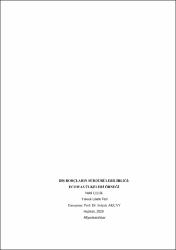| dc.contributor.advisor | Akçay Selçuk | |
| dc.contributor.author | Çelik Nebi | |
| dc.date.accessioned | 2019-11-26T06:52:57Z | |
| dc.date.available | 2019-11-26T06:52:57Z | |
| dc.date.issued | 2019 | en_US |
| dc.date.submitted | 2019 | |
| dc.identifier.uri | https://hdl.handle.net/11630/7309 | |
| dc.description.abstract | Dış borçların sürdürülebilirliği gelişen ülkeler ve özel ikle de Ağır Borçlu Yoksul Ülkeler (HIPC) için sıkıntılı bir meseledir. Bu çalışmanın amacı, Batı Afrika Devletleri Ekonomik Topluluğu (ECOWAS)’da dış borçların sürdürülebilirliğini araştırmaktır. Analizlerde; Benin, Burkina Faso, Gambiya, Gana, Mali, Nijer, Nijerya, Senegal, Sierra Leone ve Togo için (1970 – 2017), Yeşil Burun Adaları için (1980 – 2017), Gine için (1986 – 2017) zaman serisi veriler kul anılmıştır. Sürdürülebilirliği ölçmek için, birim kök testi ile Johansen ve Juselius (1990) eş-bütünleşme testi kul anılmıştır. Birim kök testlerinde toplam dış borcun ihracata oranının durağan olmaması, bütün ülkelerde sürdürülemez dış borçları göstermiştir. Ayrıca, eş-bütünleşme test sonuçları da toplam dış borç stoku ile ihracatın eş-bütünleşik olmadığını ve bunun sonucu olarak bütün ülkeler de dış borcun sürdürülebilir olmadığını göstermiştir. Sonuçlarımıza dayanarak bazı politika önerileri ileri sürülmüştür. | en_US |
| dc.description.abstract | Foreign debt sustainability is pressing issue in developing countries, particularly for Highly Indebted Poor Countries (HIPC). The purpose of this study is to investigate sustainability of foreign debt in Economic Community of West African States (ECOWAS). In the analysis time series data for Benin, Burkina Faso, the Gambia, Ghana, Mali, Niger, Nigeria, Senegal, Sierra Leone and Togo (1970-2017) for Cape Verde (1980-2017) and Guinea (1986-2017) is used. To measure sustainability, unit root test and Johansen & Juselius (1990) co-integration test are employed. The unit root tests show that total foreign debt to export ratio is not stationary in all countries verifying unsustainability of foreign debts. Further, co- integration tests results indicate that total foreign debt stock and export are not co- integrated suggesting that foreign debt is not sustainable in all countries. Based on our results some policy recommendations are proposed. | en_US |
| dc.language.iso | tur | en_US |
| dc.publisher | Afyon Kocatepe Üniversitesi Sosyal Bilimler Enstitüsü | en_US |
| dc.rights | info:eu-repo/semantics/openAccess | en_US |
| dc.subject | Dış borç sürdürülebilirliği, | en_US |
| dc.subject | zaman serisi, | en_US |
| dc.subject | eş-bütünleşme | en_US |
| dc.title | Dış borçların sürdürülebilirliği: Ecowas ülkeleri örneği | en_US |
| dc.title.alternative | Sustaınabılıty of external debts: The case of Ecowas countrıes | en_US |
| dc.type | masterThesis | en_US |
| dc.department | Sosyal Bilimler Enstitüsü | en_US |
| dc.relation.publicationcategory | Tez | en_US |
| dc.contributor.institutionauthor | Çelik, Nebi | |



















